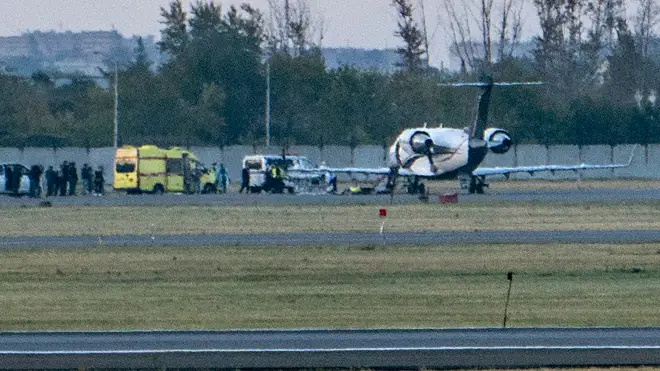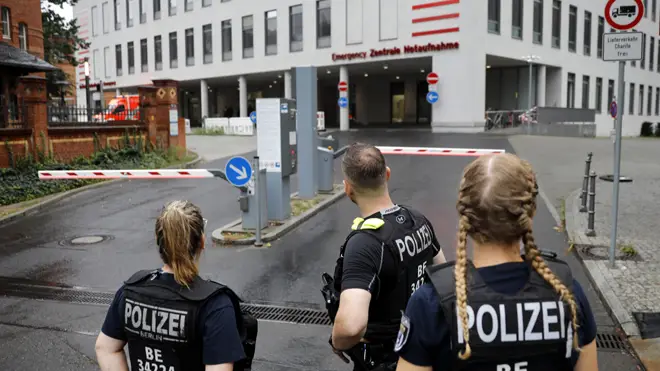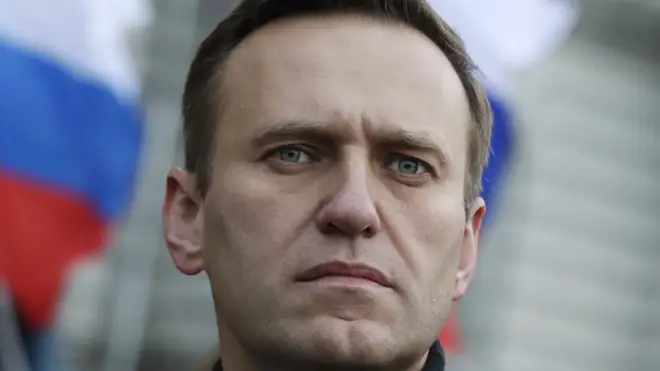
Paul Brand 10am - 12pm
22 August 2020, 08:40

A plane carrying Russian opposition leader Alexei Navalny, who is in a coma after a suspected poisoning, touched down in Berlin this morning.
Mr Navalny had hoped to reach Germany for emergency treatment after drinking tea that his supporters say was laced with poison in an attempt to have him killed.
He is currently in a coma after managing to reach a leading German hospital with the help of his supporters following what his supporters say were efforts by the Kremlin to keep him in Russia.

Russian opposition leader Alexei Navalny airlifted to Germany
He was said to have been "stable" upon arrival in Berlin.
Mr Navalny's spokeswoman and a representative of the NGO that arranged the flight confirmed that the plane had landed in the German capital, where he will be treated at the city's main hospital.

Russia critic explains how 'Putin will kill' effective campaigners against the Kremlin
"Navalny is in Berlin," Jaka Bizilj, of the German organisation Cinema For Peace, told the Associated Press.
Mr Navalny, a 44-year-old politician and corruption investigator who is one of Russian President Vladimir Putin's fiercest critics, was admitted to an intensive care unit in the Siberian city of Omsk on Thursday.

His supporters believe that tea he drank was laced with poison - and that the Kremlin is behind both his illness and the delay in transferring him to a top German hospital.
Moscow denies any involvement.
He was flown to Berlin on a plane organised by supporters, which was equipped with advanced medical equipment, and was accompanied by German medical specialists.

When the plane arrived to collect him on Friday morning at his family's behest, Mr Navalny's doctors in Omsk initially said he was too unstable to move.
His supporters denounced that as a ploy by authorities to stall until any poison in his system would no longer be traceable.
The Omsk medical team relented only after a charity that had organised the medevac plane revealed that the German doctors had examined the politician and said he was fit to be transported.
Deputy chief doctor of the Omsk hospital Anatoly Kalinichenko then told reporters that Mr Navalny's condition had stabilised and that medics "didn't mind" transferring the politician, given that his relatives were willing "to take on the risks".
The Kremlin denied that resistance to the transfer was political, with spokesman Dmitry Peskov saying it was purely a medical decision.
However, the reversal came as international pressure on Russia's leadership mounted.
It would not be the first time a prominent, outspoken Russian had been targeted in such a way - or the first time the Kremlin was accused of being behind it.
On Thursday, leaders of France and Germany said the two countries were ready to offer Mr Navalny and his family any and all assistance and insisted on an investigation into what happened.
The most prominent member of Russia's opposition, Mr Navalny campaigned to challenge Mr Putin in the 2018 presidential election but was barred from running.
Since then, he has been promoting opposition candidates in regional elections, challenging members of the ruling party, United Russia.
His Foundation for Fighting Corruption has been exposing dishonesty among government officials, including some at the highest level. But he had to shut the foundation last month after a financially devastating lawsuit from a businessman with close ties to the Kremlin.
Mr Navalny fell ill on a flight back to Moscow from Siberia on Thursday and was taken to hospital after the plane made an emergency landing.
His team made arrangements to transfer him to Charite, a clinic in Berlin which has a history of treating famous foreign leaders and dissidents.
Dr Yaroslav Ashikhmin, Mr Navalny's doctor in Moscow, told the Associated Press that being on a plane with specialised equipment, including a ventilator and a machine that can do the work of the heart and lungs, "can be even safer than staying in a hospital in Omsk".
Mr Navalny's spokeswoman, Kira Yarmysh, posted pictures of what she said was a bathroom inside the hospital which showed squalid conditions, including walls with paint peeling off, rusting pipes, and a dirty floor and walls.
While his supporters and family members continue to insist that Mr Navalny was poisoned, doctors in Omsk denied that and put forward another theory.
The hospital's chief doctor, Alexander Murakhovsky, said in a video published by Omsk news outlet NGS55 that a metabolic disorder was the most likely diagnosis and that a drop in blood sugar may have caused Mr Navalny to lose consciousness.
Another doctor with ties to the politician, Dr Anastasia Vasilyeva, said that diagnosing Mr Navalny with a "metabolic disorder" says nothing about what may have caused it - and it could have been the result of a poisoning.
Dr Ashikhmin, who has been Mr Navalny's doctor since 2013, said the politician has always been in good health, regularly went for medical check-ups and did not have any underlying illnesses which could have triggered his condition.
Western toxicology experts expressed doubts that a poisoning could have been ruled out so quickly.
Alastair Hay, an emeritus professor and toxicology expert from the school of medicine at the University of Leeds, said: "It takes a while to rule things out. And particularly if something is highly toxic - it will be there in very low concentrations, and many screening tests would just not pick that substance up."
Like many other opposition politicians in Russia, Mr Navalny has been frequently detained by law enforcement and harassed by pro-Kremlin groups. In 2017, he was attacked by several men who threw antiseptic in his face, damaging an eye.
Last year, Mr Navalny was rushed to a hospital from jail where he was serving a sentence on charges of violating protest regulations. His team also suspected poisoning then.
Doctors said he had a severe allergic reaction and sent him back to detention the following day.